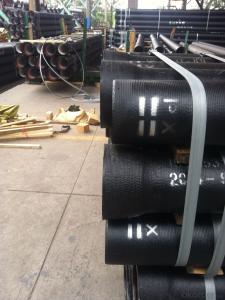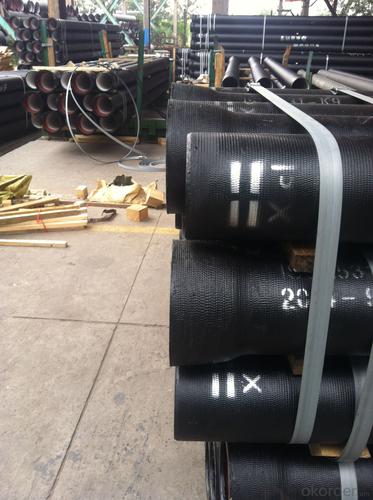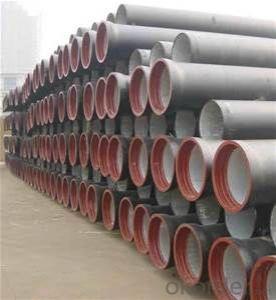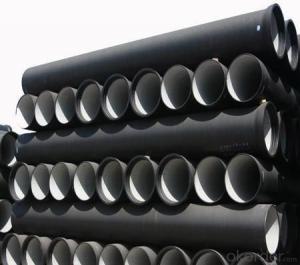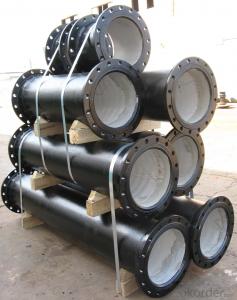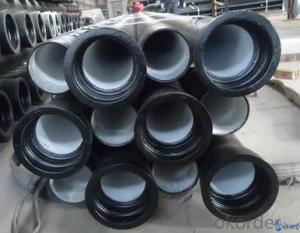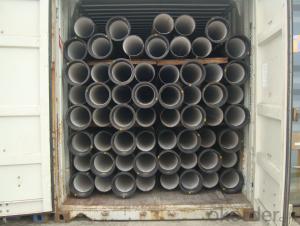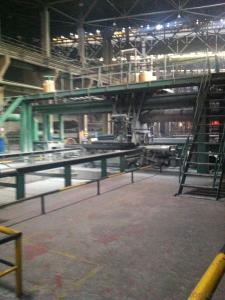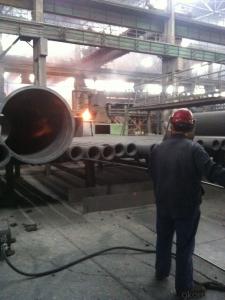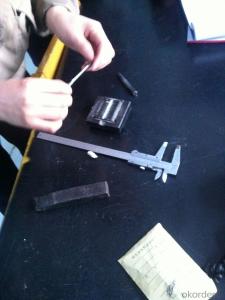DUCTILE IRON PIPE AND PIPE FITTINGS K8 CLASS DN900
- Loading Port:
- Tianjin
- Payment Terms:
- TT OR LC
- Min Order Qty:
- 23 pc
- Supply Capability:
- 3000 pc/month
OKorder Service Pledge
OKorder Financial Service
You Might Also Like
Material : Ductile Cast Iron
Size Range : DN 80mm to DN 2000mm
Unit Effective Length : 6m or 5.7m
Manufacture Standard: ISO 2531:1998/ EN 545:2006/EN 598:2007
Annual capacity : 200,000 tons
Coating Exterior: Zinc 130g/m2 according to ISO 8179-1 and bitumen coating 70 microns.
Cement Interior: Portland Cement/ High Alumina Cement/ Sulphate Resisting Cement Lining according to ISO 4179
Special requirements on external coating and internal lining can be applied
We also provide accessories such as SBR/EPDM rubber gaskets, lubricant paste, pipe caps, PE sleeves, etc.
Additional Parts:
Each pipe is strictly inspected according to related standard to ensure permanently high performance.
Easy Installation at site and service free for life
Long Service Lifespan
Quotation will arrive you within 24hours once we get your inquiry.
We guarantee offering you a competitive price.
A copy of original inspection reports of pipes will be offered after shipment.
Photos of loading process will be sent to the customer after shipment effect.
We will follow-up the delivery progress after shipment effect and update to the customer on weekly basis.
- Q: What are the lubricants for the installation of ductile iron pipes for tap water?
- When choosing lubricant, it is necessary to consider the movement of friction pairs, materials, surface roughness, working environment and working conditions, as well as the performance of lubricants. In mechanical equipment, lubricants are mostly distributed by lubrication to the parts that need lubrication.
- Q: Are ductile iron pipes suitable for use in cold climates?
- Yes, ductile iron pipes are suitable for use in cold climates. Ductile iron possesses excellent resistance to low temperatures, making it highly suitable for use in freezing conditions. Its high durability and strength enable it to withstand extreme temperatures and harsh weather conditions commonly found in cold climates.
- Q: What are the different lining thickness options for ductile iron pipe?
- The different lining thickness options for ductile iron pipe typically depend on the specific application and the requirements of the project. The most common lining options for ductile iron pipe include cement mortar lining, polyurethane lining, and polyethylene lining. Cement mortar lining is one of the oldest and most widely used lining options for ductile iron pipes. It involves applying a layer of cement mortar to the inner surface of the pipe, which provides protection against corrosion and enhances the hydraulic performance of the pipe. The thickness of cement mortar lining can vary, typically ranging from 3mm to 6mm. Polyurethane lining is another popular choice for ductile iron pipes, especially in applications where resistance to abrasion and chemical attack is required. Polyurethane linings are typically applied using a spray or casting method, and the thickness can vary depending on the specific requirements of the project. Generally, polyurethane linings can range from 1mm to 4mm in thickness. Polyethylene lining is a relatively newer technology for ductile iron pipes and is commonly used in applications where resistance to chemical corrosion is necessary. Polyethylene linings are typically applied using a rotational lining process, where a layer of molten polyethylene is evenly distributed on the internal surface of the pipe. The thickness of polyethylene lining can vary from 2mm to 8mm, depending on the specific project requirements. It is important to note that the lining thickness can be customized based on the specific requirements of the project, such as the corrosiveness of the transported fluid, the operating conditions, and the desired service life of the pipe. Consulting with a qualified engineer or pipe manufacturer is recommended to determine the most suitable lining thickness for a particular application.
- Q: What are the typical joint restraint requirements for ductile iron pipes under pressure?
- In order to meet the joint restraint requirements for ductile iron pipes under pressure, there are two common options available: mechanical joint restraints and restrained joint systems. These restraints are essential to prevent separation or pulling apart of the pipes caused by internal pressure. A mechanical joint restraint, which is widely used, involves a series of bolts and clamps that securely hold the pipes together. These restraints are applied at each joint of the ductile iron pipes to ensure a tight and secure connection. By providing axial restraint, they prevent the pipes from separating along the pipe axis. Another option is the restrained joint system, which offers both axial and angular restraint. This system includes a specially designed joint that consists of a gasket, a restraining gland, and a series of bolts or wedges. The gasket ensures a watertight seal, while the restraining gland and bolts/wedges restrain the pipe joints, preventing separation under pressure. The specific requirements for joint restraints may vary depending on factors such as the pipe's diameter, wall thickness, and operating conditions. To determine the appropriate joint restraint system for a specific application, it is crucial to consult the manufacturer's guidelines and industry standards. Furthermore, proper installation and maintenance of the joint restraints are essential to ensure their effectiveness and longevity in restraining the pipes.
- Q: What is the average diameter range of ductile iron pipes?
- The diameter of ductile iron pipes can vary depending on the application and industry standards. In general, there is a wide range of diameters available to meet different requirements. Ductile iron pipes can start from as small as 4 inches (100 mm) and go up to 64 inches (1600 mm) or even larger. These sizes are commonly used for water distribution, sewer systems, and infrastructure projects. It is important to consider factors such as local regulations, project specifications, and engineering considerations when determining the appropriate diameter range. Consult industry standards and relevant authorities for specific applications.
- Q: How does ductile iron pipe perform in areas with high ground movement?
- Ductile iron pipe performs exceptionally well in areas with high ground movement. Its unique properties and design make it highly resistant to deformation and damage caused by ground shifting, settling, or seismic activities. The ductility of the material allows it to withstand significant stress and strain without fracturing or breaking. Unlike rigid materials such as cast iron or PVC, ductile iron pipe has the ability to flex and absorb ground movement, which prevents catastrophic failures and ensures the integrity of the pipeline system. Additionally, ductile iron pipe is manufactured with a variety of joint configurations that further enhance its performance in areas with high ground movement. Flexible joints, such as restrained joints or mechanical joints, accommodate the movement by allowing limited rotation and translation, minimizing the potential for pipe separation or joint failure. Furthermore, the robust construction of ductile iron pipe, which includes a thick wall thickness and a high tensile strength, provides additional protection against ground movement. This strength helps the pipe withstand external loads and forces induced by the ground, preventing deformation and maintaining its structural integrity. In conclusion, ductile iron pipe is an ideal choice for areas with high ground movement due to its exceptional ductility, joint flexibility, and robust construction. Its ability to absorb ground movement without compromising the pipeline system's functionality or safety makes it a reliable and durable option in such challenging environments.
- Q: What is the expected corrosion protection system for ductile iron pipes?
- Typically, the expected corrosion protection system for ductile iron pipes involves a combination of external coatings, internal linings, and cathodic protection. To protect against corrosion, external coatings are applied to the pipe's exterior surface. These coatings, usually fusion-bonded epoxy, polyethylene, or polyurethane, act as a barrier against corrosion from soil, water, and chemicals. Furthermore, they play a crucial role in prolonging the pipe's lifespan. In order to safeguard against corrosion caused by the transported fluid, internal linings are applied to the pipe's interior surface. These linings, which can be made of cement mortar, epoxy, or polyurethane, provide a smooth and protective layer that prevents the formation of rust and scale. Cathodic protection is an electrochemical technique employed to shield ductile iron pipes from corrosion. It involves the utilization of sacrificial anodes or impressed current systems to generate a protective electrical current that counteracts the corrosion process. By employing this method, the formation of rust is prevented, thereby extending the pipe's longevity. It is important to acknowledge that the specific corrosion protection system for ductile iron pipes may differ depending on the application and environmental factors. To determine the appropriate corrosion protection system for a specific ductile iron pipe installation, consulting with corrosion experts and adhering to industry standards and guidelines is of utmost importance.
- Q: Ductile iron gears are generally treated without heat treatment
- Heat treatment must be necessary, generally annealed first to machine, after quenching or nitriding treatment
- Q: Can ductile iron pipe be used in high-pressure applications?
- Yes, ductile iron pipe can be used in high-pressure applications. Ductile iron pipe has excellent tensile strength and is capable of withstanding high pressure levels. It is often used in water and wastewater systems, as well as in oil and gas pipelines where high-pressure conditions are present.
- Q: Are ductile iron pipes suitable for sewage treatment plants?
- Yes, ductile iron pipes are suitable for sewage treatment plants. Ductile iron is a strong and durable material that can withstand the harsh operating conditions found in sewage treatment plants. It has high tensile strength and excellent corrosion resistance, which makes it resistant to the corrosive effects of sewage and other chemicals found in wastewater. Additionally, ductile iron pipes have a smooth interior surface that allows for efficient flow of wastewater, reducing the risk of clogs or blockages. They are also easy to install and maintain, making them a cost-effective choice for sewage treatment plants. Overall, ductile iron pipes are a reliable and long-lasting option for transporting sewage in these facilities.
Send your message to us
DUCTILE IRON PIPE AND PIPE FITTINGS K8 CLASS DN900
- Loading Port:
- Tianjin
- Payment Terms:
- TT OR LC
- Min Order Qty:
- 23 pc
- Supply Capability:
- 3000 pc/month
OKorder Service Pledge
OKorder Financial Service
Similar products
Hot products
Hot Searches
Related keywords
